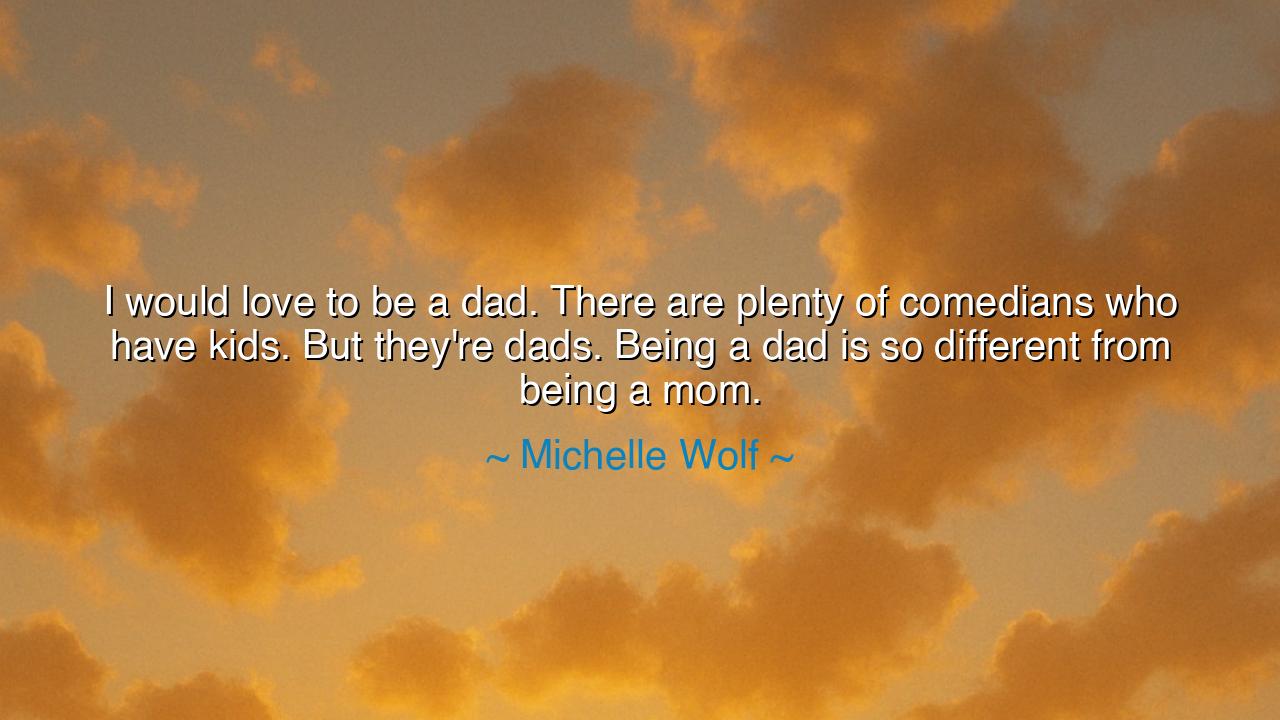
I would love to be a dad. There are plenty of comedians who have
I would love to be a dad. There are plenty of comedians who have kids. But they're dads. Being a dad is so different from being a mom.






In a moment of insight both tender and sharp, Michelle Wolf, the comedian and observer of life’s paradoxes, once said: “I would love to be a dad. There are plenty of comedians who have kids. But they’re dads. Being a dad is so different from being a mom.” Her words, though wrapped in humor, carry within them a deep reflection on the nature of parenthood, on gender, and on expectation. They speak to the unequal burdens, the invisible labors, and the unspoken truths that shape the lives of women and men alike. Beneath the laughter lies an ancient truth: that the roles of mothers and fathers, though joined by love, are divided by the weight that society places upon them.
For centuries, the image of the father has been tied to distance, strength, and protection, while the mother has been bound to nurture, sacrifice, and endless care. To be a father, in the eyes of the world, has often meant to provide; to be a mother, to give oneself entirely. What Wolf reveals in her witty lament is the longing for freedom within responsibility — the wish to experience the joy of parenthood without the crushing expectation of perfection, the constant watchfulness demanded of mothers. To “be a dad,” as she says, is to live in a role that society has made lighter, more forgiving, even when both parents love their children the same.
The ancients knew this imbalance well. In every age, mothers have been pillars of endurance, praised in poetry yet burdened in silence. Consider Penelope, wife of Odysseus, who waited decades for her husband’s return while raising their son alone. Odysseus, the adventurer, was celebrated as hero and father, though absent for twenty years. Penelope’s labor — her waiting, her faith, her daily toil — was unseen by the bards, though it was no less heroic. Thus, Wolf’s quote echoes across millennia: to “be a dad” has often meant to roam, to work, to teach — while to “be a mom” has meant to hold, to heal, to never rest.
And yet, within Wolf’s humor there is no bitterness, but clarity. She does not scorn fathers, but calls for balance — for a world where the joy of parenthood is shared, and the burdens are equally carried. Her jest reveals the longing for a time when being a parent, not a “mom” or “dad,” will mean the same in worth and in weight. The comedian’s voice becomes the philosopher’s whisper: that true equality is not achieved when women imitate men, but when both live with the same freedom, respect, and grace in love and in labor.
History, too, offers glimpses of this evolution. In the twentieth century, as women stepped into the public sphere, the sacred boundaries between motherhood and fatherhood began to shift. Men began to nurture openly; women began to lead boldly. And yet, the echoes of the old world still linger — the expectation that the mother must hold the world together, while the father may step in and out of its orbit. Wolf’s words remind us that to change this is not only a social duty but a spiritual one: to honor both care and creation, to see strength not in detachment, but in presence.
Her reflection also holds a deeper message about identity and empathy. To imagine being a father, as a woman, is not merely a joke — it is an act of understanding across boundaries. It asks: what would life be like if love were not defined by gendered duty? What if every human — man or woman — could give and receive care without judgment, without fear of being seen as less? In that imagining lies the seed of transformation, the dream of a world where compassion, not convention, shapes the family.
The lesson, then, is this: question the roles you inherit, and dare to redefine them. Whether you are mother, father, or child, remember that love is not bound by title but by action. Share the work of care; share the joy of creation. Let tenderness not be the privilege of mothers alone, nor wisdom the domain of fathers, but let both dwell in every heart that loves truly.
So, as Michelle Wolf reminds us with humor sharpened into truth, it is time for the world to see that parenthood is not a hierarchy, but a partnership. The laughter her words provoke is the laughter of awakening — the moment when the mind sees clearly what the heart has long known. Be a parent, be a friend, be a guardian of love — but above all, be human. For the child remembers not whether the hands that held them were a father’s or a mother’s, only that they were held with love.






AAdministratorAdministrator
Welcome, honored guests. Please leave a comment, we will respond soon